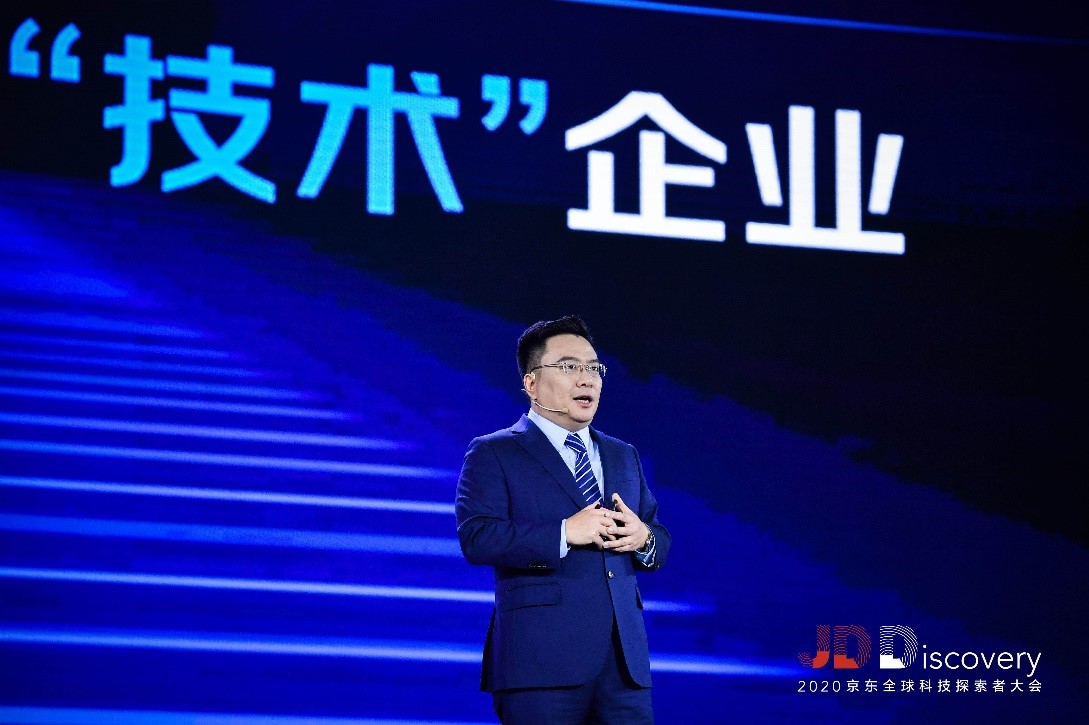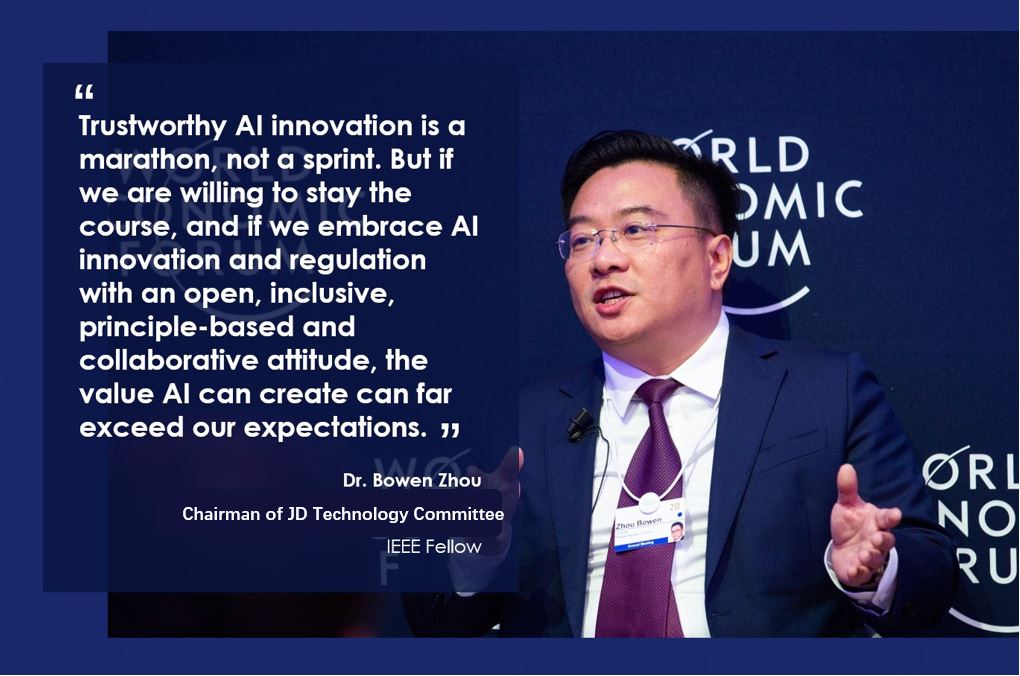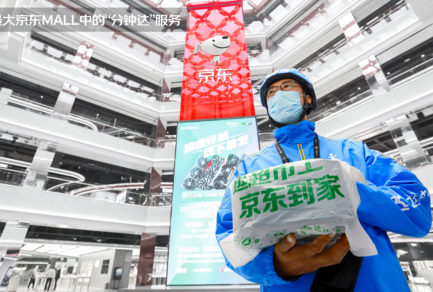May 8, 2021|
In-Depth Report: JD’s Tech Future in the Eyes of Dr. Bowen Zhou
by Vivian Yang
It has been nearly five years since Richard Liu, founder and CEO of JD.com, announced at the year-opening staff assembly in 2017 that “there are only three things that the company will focus on in the next 12 years: technology, technology and technology.”
Nine months after that defining speech, Dr. Bowen Zhou, previously the Chief Scientist of IBM Watson Group, joined JD.com. Since then he has acted as Chairman of JD’s Technology Committee with the mission to navigate the conglomerate to its tech-driven future.
On Mar. 31, 2021, JD.com completed a reorganization of its technological business and ownership, in which JD Digits was restructured and merged with JD’s Cloud and Artificial Intelligence businesses. The restructuring will better position the company “to deliver a suite of cutting-edge technology services to its business partners,” according to the company.
Doubling Down on Technology
Speaking of the restructuring, Dr. Zhou pointed out that it shows a clear direction and the strong will of JD.com to zero in on technology. “On both strategic and tactical levels, we will continue to invest in the R&D, productization and commercialization of technologies.”
Herein, JD’s technology committee plays an essential role in taking a holistic approach from the group’s perspective to map out the company’s mid- to long-term technological development plan. The committee, on the one hand, functions in pooling and synergizing technical resources across the board of the company’s business groups and units in retail, supply chain, logistics, fintech and more, to break existing silos and bolster steady development. On the other hand, the committee leverages these accumulated technological capabilities in both software and hardware of retail operations, supply chain management, automation and more, to develop AI-powered solutions that can serve more businesses and open to society.
The establishment of JD Technology’s “Foundational Technology Division,” which Zhou now leads, legitimizes JD’s commitment in technology over a long-term horizon. Rather than eyeing short-term returns, the team is instead focusing on the enhancement of R&D efficiency and continued optimization of core technological competences in AI, big data, blockchain, security and more, so as to fulfill outstanding support for its business partners and clients.
JD’s annual reports have shown that from 2017 till now, the company has put in more than RMB 60 billion yuan in technological research and development. In 2020 alone, JD invested near RMB 18 billion yuan in technology, making it a top-level R&D spender among Chinese companies.
Meanwhile, the company has quickly built up its talent base. “Since I joined JD.com in late 2017, there have been 6 IEEE Fellows attracted to JD’s expanding technology teams, and the number will keep increasing,” Zhou said. “As the company grows and technology iterates, more tech talents in diversified areas like supply chain optimization, smart manufacturing, security and more find JD’s rich business scenarios very attractive to further develop and apply cutting-edge technologies”.
In addition to attracting top-notch experts, Zhou noted that JD will emphasize fostering home-grown tech talents within the company, which requires great efforts on cultivating a work culture that encourages mentorship and passion-led exploration as well as a modernized career promotion system that rewards innovation and devotion of young employees.
By the end of 2020, there were more than 18,000 employees working in JD’s R&D functions, with 80% of them holding master’s or higher degrees. And the company has applied for more than 3,600 technology patents in the past five years, according to the company’s latest report.

Bowen Zhou, Chairman of JD Technology Committee
One Company with Two Natures
“Duality” is the word Zhou picked to describe JD’s embodiment of both Internet and real economy characteristics at the same time.
“JD has successfully moved heavy offline retail operations onto the Internet. Its self-operated model in full product categories involves a very long work chain extending from product selection, procurement, transportation to online marketing, ordering and last-mile delivery. This makes it uniquely placed to possess both online and offline experiences.”
That gives Zhou confidence to say that JD’s technological services, such as JD Cloud, have a foundation of rich know-how in supporting physical industries as they ramp up digital transformation.
Two examples of work by Zhou’s team help to show how JD’s tech-driven solutions can boost productivity on consumption and manufacturing areas respectively.
Contrary to shopping influencers’ ego-centric product recommendation approach, JD’s AI-powered product recommendation technology centers on the needs of individual customers. By taking the “if I were you” method, the system can generate customized content word-by-word for each customer to an extent that the wording expressions, picture details and layout styles of each product will automatically tailor to different shopping scenarios as customer conduct photo searches and social e-commerce interactions; and seek clothes matching guidance or pre-shopping consultations. Tests have shown that the product exposure and click rate enabled by JD’s AI recommendation system is 1.4 times higher than the former.
For another example, JD’s AI-powered quality inspection system on the production lines of a Jiangsu-based factory helped enhance its work efficiency by 10 times. Moreover, through analyzing the data of defective products, the intelligent system can derive production improvement suggestions to help the factory achieve higher product quality levels.
“Our goal is to help manufacturers to precisely identify who their customers are, what products best fit these customers and how to produce these products in an efficient and low-carbon way,” Zhou explained while underlining the value of flexible manufacturing technology in reducing waste in the production and circulation processes in order to benefit the environment.

JD’s AI-powered snapshop technology
Trustworthy AI
As the company sails toward the digitally intelligent future, Zhou has named two “paddles” for the journey in order to reach the other side.
One paddle is the implementation of Operational Technology (OT). By joining forces with more and more partners and wider ecosystems, JD continues to emerge from an e-commerce giant to a leading tech player in promoting industrial IoT.
The other paddle is the exploration in Information Technology (IT). Zhou believes that standing at the frontier of IT exploration is the only certain path for ensuring that a company will thrive over the next 10 years, and it provides impetus for greater industrial transformation.
To maintain a mutually reinforcing effect between IT and OT, JD will continue to work on opening its core competence in supply chain and modularize its technological capabilities to dive deep into more industrial operation scenarios. To meet the increasingly diversified and complicated needs of different clients, JD is stepping up efforts in building a stratified model with agile client-facing solution creation abilities at the front, advanced AI and big data processing skills in the middle layer, and solid computing and storing IaaS capacities at the back end.
In parallel, Zhou announced the establishment of JD Explore Academy during the 2020 JD Discovery conference last November, and Dr. David (Dacheng) Tao, member of the Academy of Europe, became its first president. The JD Explore Academy will focus on six major technology sectors, including AI, data science, decentralized computing, quantum computing, engineering and management, and ethics and science, aiming to realize disruptive technologies from the basic theoretical level in order to better serve the development of the real economy.

In terms of the governance and ethics of technologies, and specifically AI use in the real world, Zhou has been a firm advocate for “Trustworthy AI,” a concept for which he proposed six underlying principles in 2019 to ensure value-oriented whole life-cycle development, maintenance, and governance of AI systems, which include fairness, accountability, value alignment, robustness, reproducibility and explainability.
“While fairness, accountability and value alignment embody our social responsibility; robustness, reproducibility, and explainability pose massive technical challenges to us,” he wrote in an article contribution to the World Economic Forum.
“Trustworthy AI is something we need to treat very seriously because that’s how AI can continue to expand and grow. It is not just a single-point issue: how do you ensure an end-to-end system is trustworthy? That is really what we should care about foremost,” Zhou argued. “This concept will guide JD to design, deploy and maintain our technologies in the next 10 years.”

 This Harbin tourism boom has also spurred a surge in sales of winter apparel. JD.com’s data indicates a rapid growth in the sales of warm clothing items such as down jackets, snow boots, and thermal underwear between January 1st and 7th. The sales growth is especially pronounced in southern provinces and cities such as Jiangsu, Zhejiang, Guangdong, Sichuan, and Shanghai. Notably, tall snow boots registered a 206% year-on-year increase in transactions, while padded cotton caps and thickened long down jackets soared by 158% and 134%, respectively. Beyond clothing, travel gear has also seen a considerable uptick, with a 98% year-on-year growth in transactions for large suitcases and travel backpacks in these southern regions.
This Harbin tourism boom has also spurred a surge in sales of winter apparel. JD.com’s data indicates a rapid growth in the sales of warm clothing items such as down jackets, snow boots, and thermal underwear between January 1st and 7th. The sales growth is especially pronounced in southern provinces and cities such as Jiangsu, Zhejiang, Guangdong, Sichuan, and Shanghai. Notably, tall snow boots registered a 206% year-on-year increase in transactions, while padded cotton caps and thickened long down jackets soared by 158% and 134%, respectively. Beyond clothing, travel gear has also seen a considerable uptick, with a 98% year-on-year growth in transactions for large suitcases and travel backpacks in these southern regions.
 JD and Uxin to Develop Used Car Transaction Services
JD and Uxin to Develop Used Car Transaction Services



